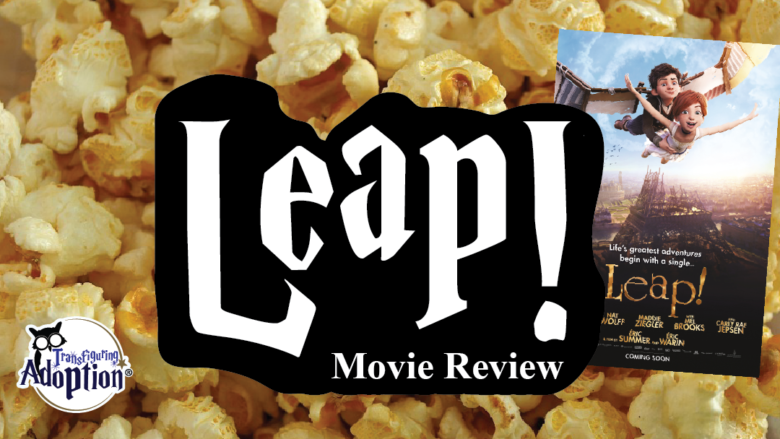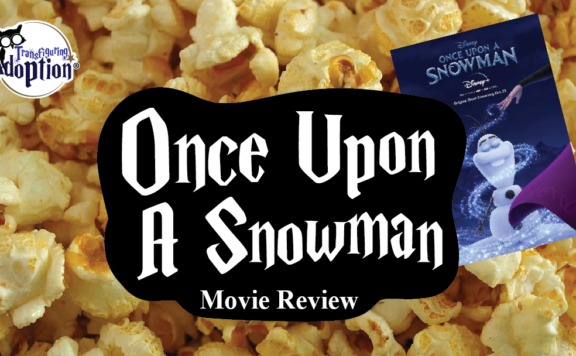Grade:
Transfiguring Adoption awarded this movie 5 Hoots out of 5 based on how useful it will be for a foster/adoptive family. [Learn more about our Hoot grading system here]
Movie Info:
- Rating: PG (for action and some impolite humor)
- Genre: Action & Adventure, Animation, Drama Kids & Family
- Runtime: 89 minutes
- Studio: The Weinstein Company
From the Cover of Leap! (2017) by The Weinstein Company:
“11-year-old orphan, Félicie (Elle Fanning) has one dream – to go to Paris and become a dancer. Her best friend Victor (Nat Wolff), an imaginative but exhausting boy with a passion for creating, has a dream of his own – to become a famous inventor. In a leap of faith, Victor and Félicie leave their orphanage in pursuit of their passions. But – there’s a catch, Félicie must pretend to be the child of a wealthy family in order to gain admittance to the prestigious and competitive Opera Ballet School in Paris. And with no professional dance training, she quickly learns that talent alone is not enough to overcome the ruthless, conniving attitudes of her fellow classmates, led by the devious Camille Le Haut (Maddie Ziegler) and her wicked mother Regine (Kate McKinnon). Determined to succeed, Félicie finds her mentor in the tough and mysterious school custodian, Odette (Carly Rae Jepsen) who, along with Victor’s encouraging friendship, help her reach for the stars.”
Transfiguring Adoption’s Overview:
Leap! (2017) is the American adaptation of Ballerina (2016), which was released in Europe prior. The movie is absolutely adorable and a wonderful movie to view as a family. There are plenty of cute, funny moments for children to enjoy as well as bits of situational humor to keep a parent interested (so no naps for this one, parents!). Most importantly, this film is a great medium to work through issues children may struggle with such as lying. I highly recommend this film for younger children, especially if they have aspirations for dance or ballet, but really anyone can enjoy this film. My teenager watched this one with me and absolutely loved the colorful characters and theme of found family, though she is a proud “tomboy”.
** Spoilers Could Be Ahead **
How Is This Relevant To Adoption & Foster Care?
Félicie is a very relevant character for children in foster care as she is the resident of an orphanage. Though she is not mistreated, she longs to escape the orphanage to become a famous ballerina along with her best friend and inventor, Victor. Félicie and Victor are so determined to make it to Paris to pursue this dream that they have 462 escape attempts under their belts by the time of the film’s start! They successfully escape and each find a way to access their dreams. However, the biggest catch for Félicie is finding her chance under the name of Camille Le Haut, a seemingly mean girl with an even meaner momma by the name of Regine Le Haut (parents, watch out for Kate McKinnon on this one, she’s a hoot in this role!). Félicie is eventually caught in her deception and then has to work through the consequences of her actions after this discovery.
This film handles Félicie’s shortcomings in a kind but firm manner that is beneficial for caregivers to observe. Upon the discovery of Félicie’s deceit all of the adults could have understandably followed Regine’s advice in showing only harsh consequences for stealing Camille’s letter and lying about her identity. However, the adults in Félicie’s life were able to see the intent behind her deception and help her grow and learn from the experience, creating several teachable moments and allowing Félicie a chance to earn her place on stage correctly and form deeper bonds with found family. I highly recommend this film for children and adults alike for this reason!
Discussion Points:
- Lying/Stealing Are Often Survival Behaviors than Moral Behaviors
It’s important for caregivers to remember that most of the time children in foster care do not lie or steal to be malicious or because they are “bad kids”. Oftentimes lying or stealing are behaviors learned so a child could survive an extraordinary event as an ordinary person with few options. These behaviors won’t go away just because the child is in a place that you believe is safe. It’s important for caregivers to be mindful of perceived safety vs. actual safety and what kinds of triggers could affect a child’s perceived safety in the home. - Children Will Make Mistakes, But How Caregivers Respond Determine If These Become Teachable Moments
Think waaaaaaay back to when you were a child. Were you truly an angel-child who never did wrong and never made a mistake? I know I’ve made plenty of mistakes but eventually learned better decision making skills from caring adults in my life who chose to make mistakes a teachable moment rather than berate me over the mistake. As adults, sometimes we tend to gloss over those things in our memories and forget how firm kindness can benefit a situation more than angry, out of control feelings from the adults. Children watch the adults to see how to react to situations so it is up to the caregiver to set the tone in processing mistakes and learning from them. - Honoring A Child’s Dreams
Little ones can have some big dreams, and it can be disheartening to see a child lose a dream because someone mocked their dream. Even if a child’s dream may seem outlandish or could change in the future, as adults we should honor our children’s aspirations and find ways to honor those dreams. We can be realistic while encouraging. Which leads to the next discussion point… - Dreams Are Important, But Hard Work Makes It Happen
As we see in the film, Félicie doesn’t just get the part of Clara from providing a well-known name or saying it will happen. Félicie had to put in a lot of work every day and get a lot of help from others around her to make that dream happen, even after making some mistakes. We can absolutely support a dream but also teach our children how to make realistic, timely, measurable goals to make those dreams happen.
Cautionary Points:
- Children Engaging in Survival Behaviors Such as Lying, Stealing, and Running Away
These are all addressed in teachable moments later in the film but still may be problematic for children that engage in such behaviors if not discussed after viewing the film and creating a teachable moment from the film. - Unrealistic Stunts
There are a few moments that parents should be aware of so that children do not attempt to act out stunts such as tossing a chicken off a roof (Victor mistakenly thinks the chicken can fly), jumping to and from moving vehicles, climbing and jumping from high places, etc. - Bullying Behaviors
Especially from Regine Le Haut, but both Regine and Camille exhibit bullying behaviors towards Félicie and Odette. This is done in an outlandish and exaggerated manner to indicate being negative behavior, but still should be noted for children sensitive to bullying behavior or acting upon bullying behaviors. - Perceived and Verbalized Violence Towards Children
During a montage it appears that Victor is being chased with the intent of harm by adult men and one of Félicie’s classmates states that an instructor would smash a child’s kneecaps for a punishment. Later in the film Regine Le Haut knocks out Victor with a wrench and tries to hit Félicie with a wrench and sledge hammer during an intense chase scene. - Children Homeless in Paris
Upon arriving in Paris Victor and Félicie are separated and we see Félicie wandering around Paris cold, hungry, and alone until she comes across the Paris Opera and finds Odette.
Discussion Guide:
- Why did Félicie lie? Was she trying to be mean or hurt anyone?
Caregiver Note: As I mentioned earlier, children often don’t mean to be malicious when they lie or steal. Children in foster care have often lived a life very different from our own and have had to learn unique ways to meet their own needs. For some children, this could be lying to their class and telling them their dad is a famous actor so they can be accepted. Some children may steal a toy because, in the past, they would not get a toy otherwise. The point with this is to teach a child that they no longer need to lie or steal to get what they need and teach them ways to express needs that will keep them out of trouble. This question will help open the door to discuss this, as this can be a hard topic to discuss if children know that lying and stealing are “big deals” to a caregiver. - Even though Félicie did not mean harm in her lies, what were her consequences?
Caregiver Note: It is important to teach our children that even if they don’t mean harm in their actions that there are still natural consequences to dishonesty. Point out how Félicie had to restart her audition process, lose trust, and risk closes relationship because of her choices. - How could Félicie have gotten help without lying or stealing?
Caregiver Note: This will help your child focus on ways moving forward to ask for help in the future as well. Remember as the caregiver that this is harder for a child to do than to say. When helping your child later with making better choices involving lying or stealing it is important for a caregiver to be mindful of situations or questions that may invite these behaviors. Remember to reward your child for asking for help or using an alternative to lying or stealing to encourage the use of those methods. - Was it a good idea for Félicie to run away? What could have happened to her and Victor had the plan not gone as originally planned?
Caregiver Note: In this it is important to highlight safety. Between climbing on the roof, jumping across various vehicles, and other unsafe behaviors Félicie and Victor could have been seriously injured in their escape. They also could have been kidnapped or taken by someone unsafe while wandering around Paris. Again, make sure to highlight safety when talking to your child before turning the discussion to how one of their caregivers could have helped them with their dreams rather than running away from them. - Victor dreams of becoming a famous inventor and Félicie a prima ballerina. What is your big dream that is so big that you are willing to work as hard as Félicie even if it’s hard and frustrating? How can I help you reach your dream like Odette helps Félicie?
Caregiver Note: This could also be considered an activity, but I advise taking notes during this part of a discussion. Work with your child to come up with goals and action steps for each of these goals. Then, make the plan look nice with colors and maybe a pretty typing font so they can display their plan to pursue their dreams. Children at times need something visual to help plan for the future due to development milestones not being met depending on their age. This will also help the plan feel more real for your child as they can check off action steps as they are completed. - When Félicie is discovered and caught in her lies, what would have been appropriate consequences for lying and stealing Camille’s identity? Why did the adults give Félicie a chance to audition as herself?
Caregiver Note: Again, for this discussion it is important for a caregiver to remember the reasons children may engage in survival behaviors to help your child through this discussion. Most of the time children do not connect their feelings to their behaviors and may need help with this. It can be noted that Félicie could have lost her chance of ever becoming a ballerina but that the caring adults in her life saw her hard work and intentions were not mean and were willing to give her a chance to prove herself as deserving of the part of Clara. - Are there times where it is hard for you to ask for help for something you need? How can I help you when asking is hard?
Caregiver Note: Some children are not used to using their words to ask for help or attention, so this may take some time and practice to ask to borrow your coat or a book. It may be good to come up with a code word or phrase your child can use when they are struggling to make a good choice or ask for help. This can be a code word or phrase that lets you know they need time to think or to work together with you to find a solution. - Félicie makes a choice to forgo training in favor of a date with Rudy and because of this misses her audition. She listens to Rudy instead of Odette, saying “You’re not my mom!” Even though Odette is not Félicie’s mother, who was looking out for Félicie’s best interest?
Caregiver Note: Children hear a lot of input from a lot of different people, peers and adults alike. It’s natural for children to want to be liked by their peers and sometimes they may agree to bad choices due to the peer influence, or even the influence of an adult that does not have the child’s best interest at heart. Use this discussion as a way to convey that though you may not be a biological parent that you are like Odette in that you care very much for your child and will always speak up to protect your child and love your child even if it’s not what your child wants to hear in the moment. - Though Félicie apologizes to both Odette and Victor pretty quickly after her mistakes it takes Victor longer to accept Félicie’s apology. Has there been a time where it was hard for you to forgive someone else’s mistake quickly?
Caregiver Note: One consequence to lying or stealing is losing trust from others. It’s important for children to know that they are loved by you unconditionally but that by lying or stealing they are taking away trust they have built with those they care about. Talk through what rebuilding trust may look like and how actions may need to accompany words when apologizing to someone for violating that trust. - Activity: Practice Barre Ballet Stretches
Caregiver Note: Find a short Barre instruction video on Youtube and practice the exercises like Félicie. Talk to your child about doing Barre for fun but also being able to practice Barre when they feel overwhelmed or angry as sometimes exercise can help us get angry energy out in a positive way before talking it out. Practice these together often and your child will learn a coping skill and the caregiver will get one heck of a work out!
NOTE: Inclusion on these lists does not necessarily mean endorsement. Furthermore, with all our resources, we highly recommend you preview them first to determine if there are any trauma triggers that your child may not be ready to handle. Transfiguring Adoption does not intend for its reviewers nor its reviews to be professional, medical or legal advice. These reviews and discussion guides are intended to help parents to better be able to connect and understand their children who come from traumatic backgrounds.







